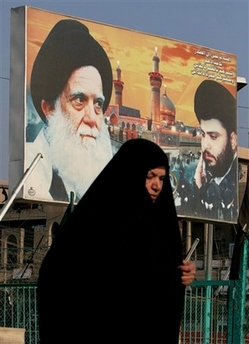Iraq adviser: Muqtada al-Sadr in Iran
(AP)Updated: 2007-02-15 17:59
AGHDAD, Iraq - An adviser to Iraq's prime minister said Thursday that radical Shiite cleric Muqtada al-Sadr is in Iran, but denied he fled due to fear of arrest during an escalating security crackdown.
"I confirm that Muqtada al-Sadr is in Iran on a visit," said al-Askari. "But I deny that his visit is a flight."
The statement came a day after conflicting reports on al-Sadr's whereabouts. US and Iraqi forces have increased pressure on backers of the anti-American cleric and other militants in a major security operation that began in force this week.
The chief US military spokesman, Maj. Gen. William Caldwell, said al-Sadr "is not in the country" and that "all indications are, in fact, that he is in Iran." Al-Sadr's supporters have insisted he was still in Iraq.
It was not immediately clear whether al-Sadr's absence will lead to divisions among his loyalists, which include the Mahdi Army militia that has close ties to Iran. A splintering of his forces could lead to the emergence of smaller gangs vying for power among Iraq's Shiite majority.
Caldwell said US authorities have been tracking al-Sadr's movements for months. He would not speculate on whether al-Sadr fled to escape the crackdown.
But the mercurial al-Sadr, who is not believed to have visited Baghdad in more than two years, often drops out of public view for weeks or months at a time. He failed to turn up for a planned speech Monday in the southern city of Najaf, where he lives, and has not been seen in public since Jan. 3.
He is believed to sleep in a different location every night to guard against attack.
When al-Sadr preaches at a mosque in Kufa, a town near Najaf, his security officers send out decoy convoys to confuse would-be attackers. His main fear is said to be an attack by rival Shiites, but he is also worried about the Americans and assassins hired by Sunni religious extremists who consider Shiites to be heretics.
Al-Sadr's militia is widely believed to receive Iranian
money and weapons, but his relations with Tehran are not as close as are those
of some Kurdish and Shiite parties allied with the Americans.
| 1 | 2 |  |
|
||
|
||
|
|

